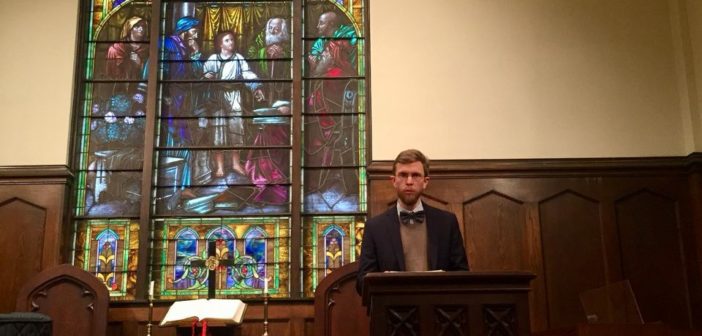The Shimer Great Books School sponsored “How Should We Read the Bible” on Feb. 21 in Koten Chapel. As part of the event, Florian Klug, professor of Catholic theology at the University of Würzburg in Germany, presented his lecture “The Iconic Being of the Bible,” which suggested a way to resolve the conflict between the views of scholars who read the Bible as a historical document and believers who read the Bible as a divinely inspired guide.
The event was organized by Shimer faculty member Adam Kotsko. According to Kotsko, Klug’s university provides its professors with funding to visit other scholars abroad, similar to that of a Fulbright Scholar. Kotsko took Klug’s visit as an opportunity for him to give a lecture to NCC students and faculty to teach them about his work.
“I was very encouraged to see every professor from the religious studies department here,” said Kotsko. “I think that anytime we could get people thinking seriously about theology and the Bible that that’s a good thing.”
After Klug gave his lecture Shelley Birdsong, assistant professor of religious studies, gave a response with her own interpretation of the lecture. “The Bible stands as a sacramental filter between the unperceivable God and passive human perceivers,” said Birdsong. “The passive human perceivers can gather some divine inspired truth from the biblical text, but only in part, not in full.”
In her interpretation, Birdsong also stated that people with grace acquire the “gifted” perspective, which allows them to gain to more truth in God and in the Bible, while people with no grace only see textual surface in the Bible and view it as just any other typical book.
“Those who read the Bible with gifted perspective and share their interpretations in a church community have a fuller and more accurate view of the Bible and God,” said Birdsong. “The goal is for humans to attempt to look beyond their own subjective interpretation and even through the sacramental filter to the object and source of truth.”
“Klug has claimed that the Bible has the potential to be understood as more than just a textual surface rather it can and should be understood as a sacramental icon or conduit that channels the divine glory and truth to humanity who wouldn’t otherwise be able to perceive God,” said Birdsong.
Although the event consisted of interpreting the Bible, it was not meant to promote people to convert to Christianity, rather give “an example of an intellectually rigorous approach to religion and the Bible that hopefully invited a lot of other people into the discussion,” said Kotsko.

